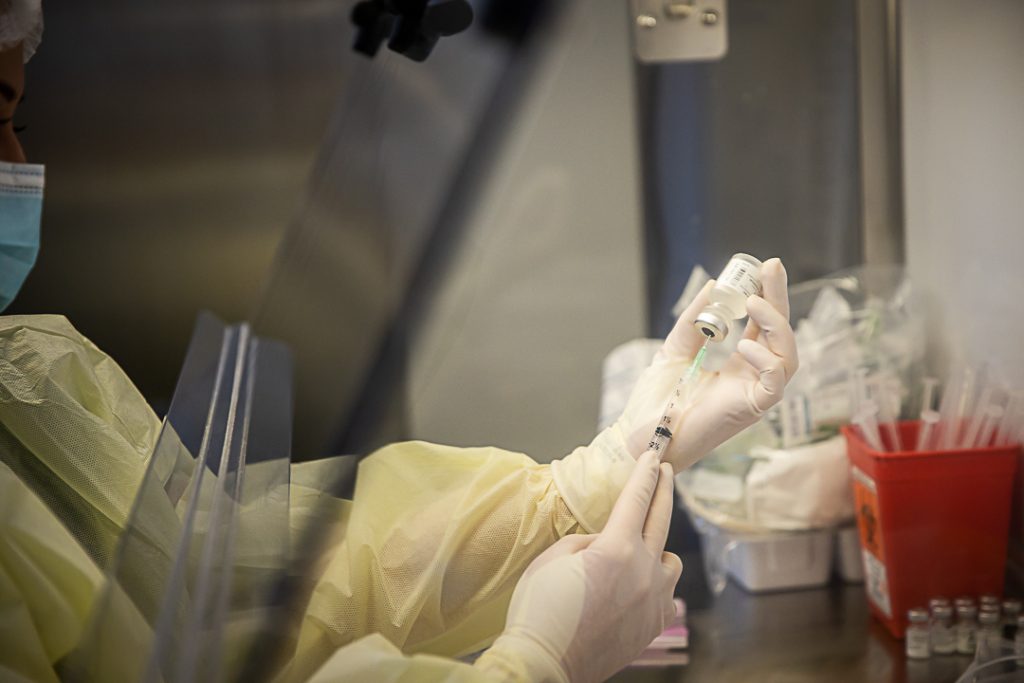
Statement on AstraZeneca vaccine hesitancy by HHS hematologist and thrombosis medicine physician
HAMILTON, ON – The below statement was shared in its original version by Dr. Menaka Pai, hematologist and thrombosis medicine physician at Hamilton Health Sciences, on her Twitter account on Friday, March 19, 2021. In it, Dr. Pai emphasizes that the benefits of the AstraZeneca vaccine far outweigh the risks.
This is a long thread on vaccines and blood clots (from somebody who spends an inordinate amount of time thinking about, preventing and treating blood clots).
Yesterday Health Canada and PHAC, MHRA, the European Medicines Agency and my profession’s organization – Thrombosis Canada – made clear statements that risks posed by the AstraZeneca vaccine are far outweighed by its benefits. Does that square with media reports? Should we really get the first shot available to us?
I love my job as a blood and blood clot specialist – love it! So much of it focuses on talking to people about risks and how to stay safe despite those risks. A lot of common medical procedures, drugs and life experiences (aging, pregnancy) increase your blood clot risk. But, we take them on anyway because we’ve weighed our individual risk and benefit in the moment. We do so because we’ve decided that what’s on the other side is worth it – a new hip, a new baby, prevention of pregnancy, the long plane ride, the limb saving cast…
They’re worried about the risk of clots with the AstraZeneca vaccine. Let’s use that awesome human instinct (caution) and look at the data. Here’s what we know, now:
- The AstraZeneca vaccine doesn’t increase the risk of blood clots beyond the general population signal;
- Getting the AstraZeneca vaccine reduces your risk, overall, of dying or hospitalization;
- Our vaccine safety and surveillance system is SOLID. It picked up approximately 40 unusual serious clots (out of 20,000,000+ doses), some associated with low platelets (sticky cells that help your blood clot).
These rare, serious clots are concerning. But, if you’re eligible for AstraZeneca vaccine? Our province is saying you’re at risk for COVID-19. So that ultra rare risk is outweighed by the real and common risks of COVID-19 – an illness that itself gives you a less than one in 100 risk of blood clots.
The biggest driver of blood clots in the COVID-19 landscape is not vaccine — it’s virus. This virus has wreaked havoc on every aspect of our life. It’s kept kids out of school, threatened small businesses, taken away hugs, smiles, backyard barbecues and drinks with friends.
The best way to see ourselves through this havoc remains the vaccine. The best way to prevent clots remains the vaccine. I trust our country’s health approval and surveillance process. I trust it to guide me, and guide people I care about (my patients and loved ones).
Scientists (including blood clot specialists) continue to collect and analyze data on vaccines, so we can detect, treat, and advise with confidence. We (your doctors) will continue to give you our best advice, based on the best evidence.
We must work with you to talk about risks, benefits, fears, hopes, and strategies to keep you safe and in tune with your body. We’ll do that together. Take the first vaccine that is offered to you, and we will get through this together too.
And for up-to-date, clear, science based information about blood clots, COVID- 19 vaccines, best evidence, and COVID-19, visit Thrombosis Canada at www.thrombosiscanada.ca/ and the Ontario COVID-19 Science Advisory Table at www.covid19-sciencetable.ca.
Dr. Menaka Pai, MS, MD, FRCPC
Hematologist and thrombosis medicine physician at Hamilton Health Sciences
@MPaiMD
– 30 –
For more information, please contact:
Wendy Stewart
Communications & Public Affairs
Hamilton Health Sciences
stewartwen@hhsc.ca
